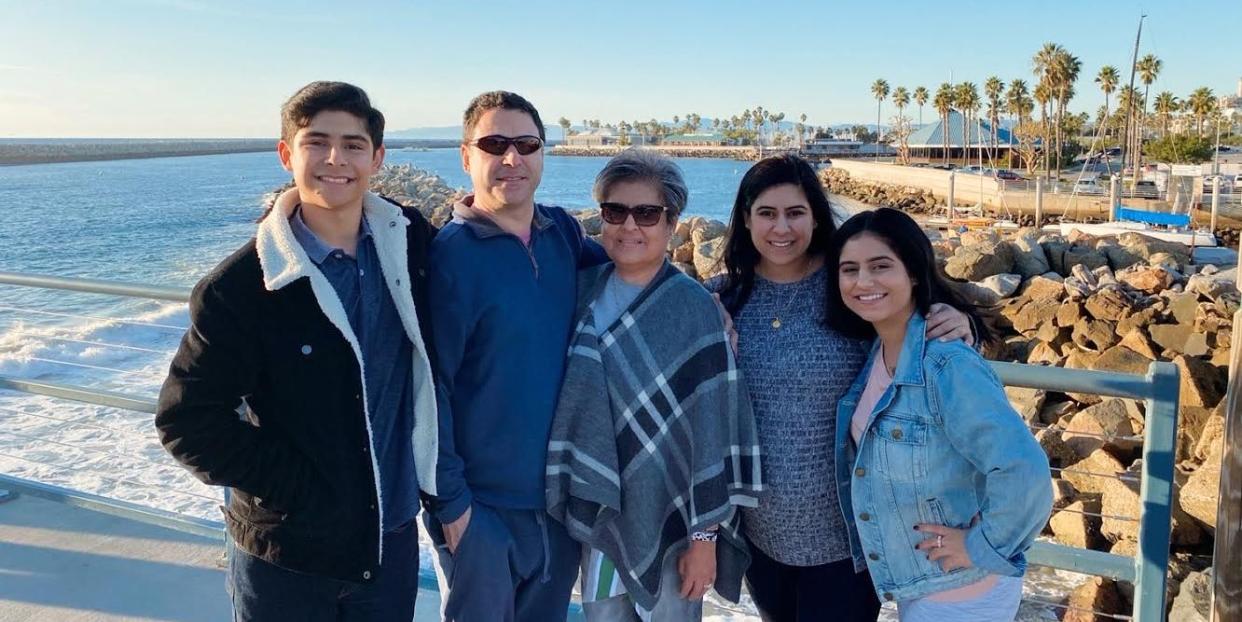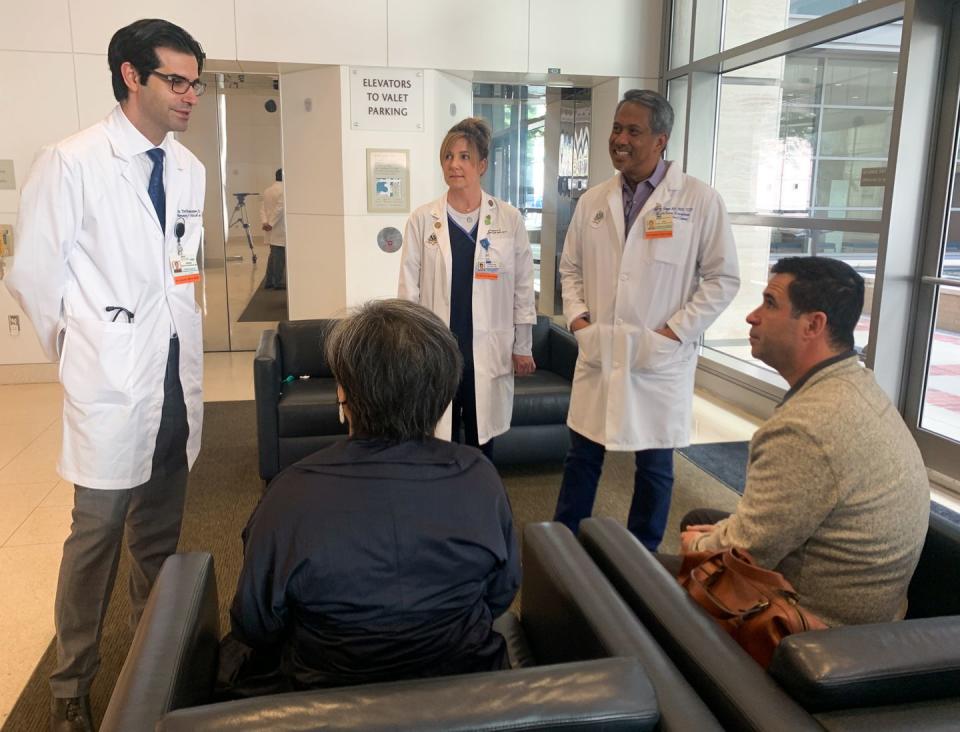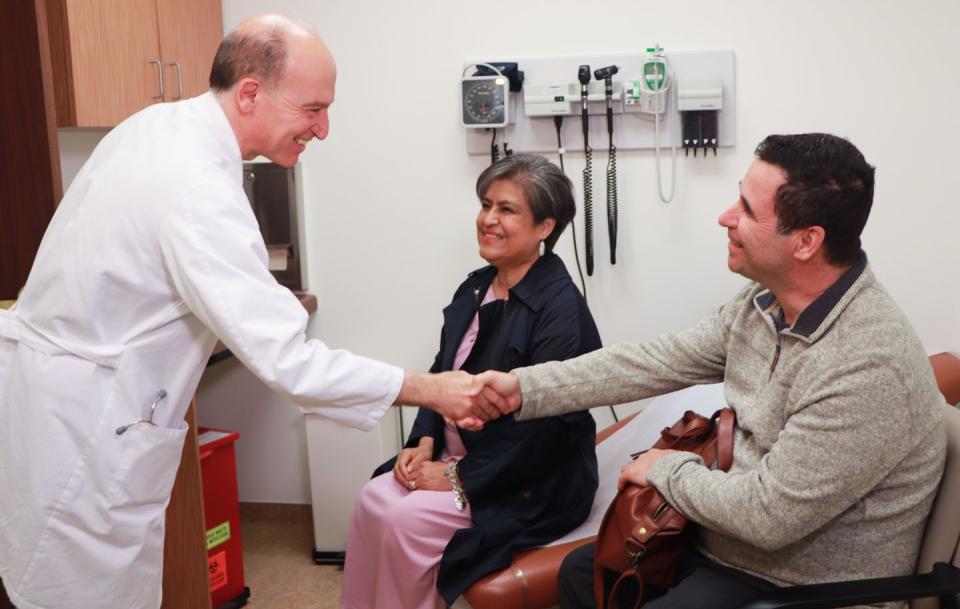A Year After Her Double Lung Transplant, One Woman Has a Renewed Outlook on Life and Faith

Miriam Merianos, 47, can distinctly recall how she felt when she grew ill almost two years ago while living in Houston, Texas. "It was October [2018] when I started feeling aches, and a little temperature here and there," she tells Woman's Day. "It would go away, and a couple of days later it would come back. I just was not feeling like my body was well. I felt fatigued, and just tired." She remembers the week of back-and-forth doctor visits, where she would tell the physicians that her chest tight and she just knew something wasn't right. She very clearly recollects the way the doctor's dismissed her recurring symptoms.
"They kept checking me, they kept doing blood work, they did x-rays," she says. "They kept going back and forth saying, 'No, you’re fine, you’re fine, you’re fine.'"
She can conjure up, in great detail, how after being administered antibiotics following yet another doctor's visit, she didn't feel well and stayed home from work, where she had been a customer service representative for over 10 years.
"I told my husband, 'I'm not going into work. I don't feel good.' He said, 'OK, do you need me?' And I said, 'No, I'm fine. I'll just stay home."
But Merianos wasn't fine, and by 10:00 a.m. that Monday morning she had called her husband back, telling him the tightness in her chest had worsened, she was short of breath, and she didn't feel comfortable driving herself to the emergency room. Her husband said he'd call one of their two daughters to come pick her up and take her to the nearest hospital for help.
"One of the girls came and picked me up and took me to the hospital," Merianos recalls. "And after that, I don’t remember anything that happened. I don’t remember anything. I woke up in January of 2019."
After waking up from a coma, Merianos was forced to face a new reality.
What Merianos didn't know the day she walked into that emergency room, and would later learn when she finally came to, was that she had contracted the flu. The virus had attacked her lungs, destroying them. Her body had gone into shock as a result, and in an attempt to mitigate the damage doctors put her into a medically-induced coma for over two months. During those months she coded four times, got the shingles, and went into kidney failure.

"My daughter was the one who was there with me when I woke up," Merianos says. "And I asked her, 'Where am I? Am I going to be here long? Is this going to be a long stay?' And my daughter said, 'Mom, you’ve been in a coma for a while."
The news was jarring, to say the least, as was the realization that Merianos was now reliant on machines to keep her alive, including an extracorporeal membrane oxygenation (ECMO) machine, which worked for her heart and lungs. She could barely move her body, had developed a foot drop on her left side as a result of the coma, and could hardly find the strength to press the button to call nurses for help. She needed a double lung transplant, but doctors would not operate, or even put her on the donor list, until she was stronger and more stable. She was facing an uphill battle, and unsure if she would be able to live without the help of machines.
"I had to re-learn how to walk, and how to hold stuff," Merianos says. "I wasn't even able to grip a cup without any water in it. They had to teach me anything. In my in my mind I was like, I can’t live like this."
Faith helped Merianos through the darkest of days.
Prior to getting gravely ill, Merianos was incredibly healthy — she didn't even take simple, over-the-counter medication, like Advil. "I worked out twice a day, five days a week, my eating was very healthy and I never smoked, never drank," she says. She was also very involved in her Greek Orthodox church, and taught Sunday School every week. So as her body was facing a set of new challenges, she relied heavily on her faith to see her through her darkest days of rehabilitation.
"My priest from our church would come by," Merianos explains. "And a monk would come by and pray for me. And that brought me a lot of stability and [helped me be] OK with what happened to me, and knowing that I was just going to get better and that this was something that I just need to accept. I couldn’t just sit there crying, wondering why me, why me?"
Merianos says she'd pray to Jesus Christ, the Virgin Mary, and the patron saints of healing. Monks who lived in a nearby monastery where both Merianos and her two daughters were baptized would come to pray for her, bless her, and bring her holy water.

"I was married in the Greek Orthodox faith, and we believe in healing and accepting challenges as they come into your life and to just pray and ask for forgiveness and to just believe that you will be better; that your faith will help you through this," she says. "A lot of our friends prayed for us, our loved ones, everybody was sending out prayers to us and telling us to not lose our faith and to believe in our faith and that will get us through the hard times. And I believe in that."
Merianos faced 20 rejections in her search for a new set of lungs.
Through her faith, a lot of hard work, and dedicated care from her team of doctors, nurses, and physical therapists, Merianos finally grew strong enough to be considered for organ donation. But upon further review by her doctors, it was revealed that her anti-bodies were too high, meaning her body would essentially reject a new set of lungs and any transplant that was undertaken would fail. "The doctor said, 'Sorry, but the board decided [the surgery] was too high-risk,'" Merianos explains. "We just can't take that risk and that responsibility."
"You have worked all this time to try and get your body a little bit stable, only to hear, 'Sorry, we can’t do anything for you,'" she continues. "So in my mind I was like, 'Well, so what now? Am I supposed to live with this machine on me? Am I supposed to just be in hospital? Am I going to be able live a long life?'"
Merianos's husband and daughters jumped into action, sending emails and letters to hospitals and transplant programs across the country, detailing the medical intricacies of her case and pleading with any doctor who would listen to take it on. They were rejected by 20 transplant programs, all saying the same thing: she's to high-risk. We can't take the responsibility. There's nothing we can do for her.
Thankfully, Merianos had another advocate on her side — her doctor, who had given her the news that his hospital's board would not move forward with a transplant. "He came back and said, 'I’m going to do whatever it takes. 'I am not going to let you just sit here. You’re going to be OK,'' she explains. "So that kind of brought me a little bit of hope— that at least he was going to try something else, and I wasn’t going to be on this machine forever."
Her doctor kept his word, and during a conference in Hawaii he met with a fellow physician and his personal mentor, Dr. Abbas Ardehali, a cardiothoracic surgeon and surgical director of UCLA's Heart, Lung, and Heart-Lung Transplant programs. After learning about Merianos's case, and watching video of her walking by herself in her hospital in Houston, Texas, he decided that he could, and would, help.

Merianos was airlifted to Ronald Reagan UCLA Medical Center in Los Angeles, California, stabilized, and put on a new treatment to help keep her body from rejecting a new organ. After three weeks, her antibodies went down and she was listed on the transplant donor list.
The phone call of a lifetime.
"You keep waiting and waiting and asking yourself, 'Is this going to be this week? Is this going to be the day?' But after a while, you just get into your basic hospital routine," Merianos says. "And then out of the blue — at about 7:30, 8:00 in the morning — the nurse was like, 'You have a call. You have to take this call.'"
But Merianos says she didn't want to take the call — she was terrified it was going to be bad news. "In your mind you‘re thinking something happened to your family and you’re like, 'Oh no, what’s going on?' So I didn’t want to take the call, because I don’t want to hear that someone I loved was in an accident," she explains. "I just started to think of the worst."
Instead, Merianos asked the nurse if she could take a message. But the nurse insisted, telling her that this was one call Merianos simply had to take herself.
"That's when I heard, on the other end, a nurse, who said, 'Ms. Marianos, we have a match for you.' And you’re just.. your heart just drops and you’re like 'wow,'" Marianos explains. "They said, 'We’re going to get you ready, we just wanted to call you with the good news. And we’ll let the rest of your family members know that your lungs are on your way.'"
But that wasn't the only good news Merianos received in a 7-day timeframe.
"That same week my daughter called me as well and said, 'Mom, you’re going to be a grandmother,'" she says. "It couldn’t have been a better week."
A new breath, and a renewed outlook on life.
After more than nine months on the ECMO machine, Merianos prepared to receive a double lung transplant. And while her team of doctors and nurses were candid about the surgery, the potential complications, and how hard it would be on her body, she says she felt confident and positive even as they were wheeling her into the operating room.
"I wasn’t nervous, I was just excited," she says. "They tell you what to expect and you just get your mind ready, like, 'OK, you know what it’s going to hurt for a little bit, but you're going to get better. You're going to be OK. You’re not going to be on this machine. You’re not going to need oxygen.'"
Just a day after the double transplant, a surgery that "required a multidisciplinary approach involving team members from the lung specialist to infectious disease to people who specialize in immunogenetics," according to Dr. Ardehali, Merianos was breathing on her own.

"Six or seven hours after surgery, I was sitting in my chair like it was nothing," she says, recalling those moments post-coma when she could barely move her arms or fingers to press the call button for the nurse. "They'd say, 'Mrs. Marianos, you don’t have any oxygen,' and I'd be like, 'No, no. I need it. What if something happens to my lungs? What if I'm out of breath?' But they said, 'No, you’re breathing on your own.' They told me I just had to let go and trust [them]."
After listening to, and trusting, her doctors, nurses, and physical therapists at Ronald Reagan UCLA Medical Center, Merianos said that she finally started to feel like herself again. And while she still requires some assistance moving ("I can walk, but I have a dropped foot on my left side. So opening bottles, just little stuff like that, I need help with that."), she is thankful for the capabilities of Dr. Ardehali, the other doctors and nurses who worked on the transplant team, and the grace of God. And now, almost a year later, she is constantly reminded of her faith and how this experience has brought her closer to it.
"I was looking at my stomach and thinking, 'Wow I have a lot of scars — they’re my battle scars. They show what I went through," she says. "And when I staring at them and looking at them, I noticed they are in the shapes of crosses. So I called my husband and said, 'Can you look these scars and tell me what they see?' And he said they look like crosses, too.
"I believe my faith is really strong," she continues. "I believe that God was always there with me and protecting me."
You Might Also Like


